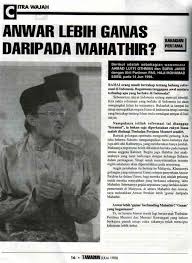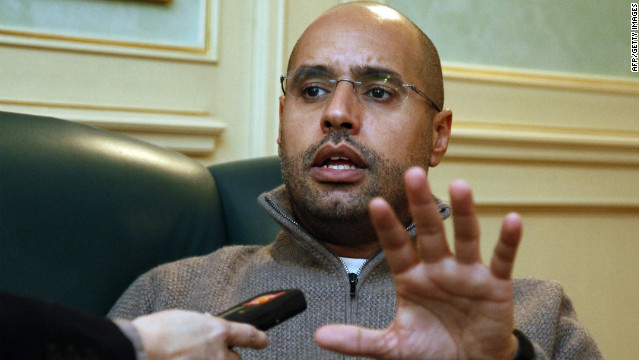
Tidak ada peristiwa yang lebih tepat untuk mentakrifkan Malaysia
daripada peperangan yang berterusan antara Anwar Ibrahim dan Mahathir
Mohamad. Pertelingkahan mereka telah membentuk lanskap politik negara
sejak tahun 1998.Pelbagai kiasah telah dimuatkan termasuk ‘character
assasination’ paling keji, kemerosotan badan kehakiman, integriti
pasukan polis yang tercalar dan pengongkongan media oleh kerajaan yang
memerintah. Kesan-kesan persengketaan ini akan terus menentukan haluan
negara untuk bertahun-tahun yang akan datang.
Sehingga kini, punca perbalahan tersebut masih diselubungi misteri.
Menjelang pertengahan tahun 1990-an, ia telah menjadi jelas bahawa
ancaman yang paling serius kepada kuasa Mahathir ialah kaliber dan
kepimpinan timbalannya. Mungkin kerana dia mula merasai Anwar sudah
mula menjauhkan dirinya dari Mahathir, lebih menyerlah dari segi
pegangan agamanya dan menampakkan dirinya tidak menyukai sekatan ke atas
kebebasan awam yang telah menjadi lambang pemerintahan Perdana Menteri
Mahathir.
Namun begitu, Mahathir terus melantik Anwar sebagai penggantinya
sehinggalah hubungan mereka betul-betul retak semasa krisis kewangan
Asia. Pada Perhimpunan Agung UMNO pada tahun 1998, penyokong kuat
Anwar, Ahmad Zahid Hamidi, mengkritik kerajaan kerana tidak melakukan
secukupnya untuk memerangi rasuah dan kronisme. Maklum balas adalah
tidak ketara tetapi kesannya amat ketara.
Berminat dalam hal ekonomi

Mahathir mula berminat dalam polisi ekonomi Malaysia dan Anwar
mendapati dirinya semakin dipinggirkan. Pada 2 September, dia dipecat
dari jawatan Timbalan Perdana Menteri dan Menteri Kewangan, dan segera
diusir keluar dari UMNO. Tiada sebab diberikan bagi pemecatan itu,
namun, media telah membuat spekulasi bahawa ia berkaitan dengan dakwaan
salah laku seks yang diedarkan di dalam "surat layang" pada perhimpunan
agung '98.
Oleh kerana lebih banyak tuduhan-tuduhan jahat yang timbul, penyokong
Anwar membalas dengan mengadakan perhimpunan jalanan besar-besaran yang
jelas menunjukkan siapa rakyat Malaysia lebih mahukan untuk memimpin
mereka. Tidak hairanlah bahawa pada 20 September, Anwar ditangkap dan
diletakkan dalam tahanan di bawah Akta Keselamatan Dalam Negeri (ISA).
Sekali lagi, tiada sebab yang jelas telah diberikan bagi pemecatan
Anwar, namun rakyat dibuat untuk mempercayai bahawa ia adalah disebabkan
oleh dakwaan salah laku seks semasa perhimpunan agung dan ini datang
dari media yang dikawal oleh kepimpinan UMNO.
Kali ini buku 50 dalil Kenapa Anwar Tidak Boleh Jadi PM telah
diedarkan dan ia mengandungi penerangan dakwaan serta tuduhan rasuah
terhadap Anwar. Buku ini telah ditulis oleh Khalid Jafri, bekas editor
akhbar Utusan Malaysia dan bekas ketua editor majalah yang gagal, Harian
Nasional kedua-duanya dikawal oleh kerajaan.
Anwar mendapat injunksi mahkamah untuk menghalang pengedaran buku dan
memfailkan tuntutan mahkamah terhadap penulis kerana memfitnah. Polis
mendakwa pengarang buku dengan penyebaran berita palsu yang berniat
jahat. Antara dakwaan di dalam buku ini adalah bahawa Anwar adalah
lelaki homoseksual. Pihak polis telah diarahkan oleh Mahathir untuk
menyiasat kebenaran dakwaan-dakwaan buku ini.
Ironinya, walaupun penulis didakwa kerana menyiarkan berita palsu,
intipati buku disiasat seolah-olah ia adalah benar. Namun, siasatan
telah dijalankan dan ini membawa kepada perbicaraan mahkamah yang paling
kotor yang dikenali sebagai Liwat I pada tahun 1998, yang juga
melahirkan sekuel pada tahun 2008 - Liwat II.
Tiada satu pun yang di atas boleh berlaku tanpa pengetahuan Mahathir.
Dan sesungguhnya, sedikit- sebanyak dia bertanggungjawab untuk
membenarkan perpecahan berlaku didalam parti UMNO dan masyarakat Melayu
dan menyebabkan kekacauan di dalam negara ini.
Menarik juga jika diperhatiankan sebab awal berlakunya krisi ini
seolah-olah berkait rapat dengan cara Anwar - sebagai Menteri Kewangan -
menguruskan krisis kewangan negara.
Kawal lwn liberal

Semasa krisis kewangan Asia pada tahun 1997, Anwar menyokong Tabung
Kewangan Antarabangsa (IMF) dan World Ban dalam pelan pemulihan ekonomi.
Beliau juga dimulakan pakej penjimatan yang memotong perbelanjaan
kerajaan sebanyak 18%, seperti memotong gaji menteri dan projek-projek
utama yang tertunda. "Projek-projek Mega", yang telah menjadi asas
kepada strategi pembangunan Mahathir, banyak disekat.
Walaupun banyak syarikat Malaysia yang bakal menghadapi kebankrapan,
Anwar menyatakan: "Bail out tidak akan berlaku dan mana-mana bank akan
dibenarkan untuk melindungi diri mereka dan kerajaan tidak akan campur
tangan." Anwar menyokong pendekatan pasaran bebas, termasuk pelaburan
asing dan liberalisasi perdagangan.
Mahathir sebaliknya menyalahkan spekulator mata wang seperti George
Soros dan menyokong kawalan mata wang yang disokong dan peraturan yang
lebih ketat daripada pelaburan asing. Ia adalah jelas bahawa dia telah
tidak gembira apabila pada tahun 1998, Newsweek magazine menamakan Anwar
"Asian of the Year". Ia merupakan satu tamparan hebat kepada Mahathir,
yang menganggap dirinya seorang pemimpin yang hebatt, berpandangan jauh
dan berkebajikan.
Pada akhir tahun itu, pertelingkahan di antara Anwar dan Mahathir
menjadi hebat semasa Perhimpunan Agung UMNO yang diadakan empat tahun
sekali. Sayap Pemuda UMNO, yang diketuai oleh sekutu Anwar iaitu Ahmad
Zahid Hamidi, memberi isyarat bahawa ia akan memulakan perbahasan
"kronisme dan nepotisme".
Mahathir membalasnya, dengan memecat Anwar dan mengisytiharkan
timbalannya itu "ejen barat". Beliau memberi amaran bahawa Anwar akan
menjatuhkan Malaysia jika IMF dibawa masuk. Krisis antara 2 lelaki ini
disebabkan oleh yang Mahathir yang lebih gemar akan ekonomi yang
terkawal manakala Anwar menyokong liberalisasi ekonomi.
Hidup dalam penipuan sejak 13 tahun

Sejak beberapa tahun kebelakangan ini, lebih tepat lagi,13 tahun,
Mahathir telah hidup didalam mimpi bahawa dengan menolak bantuan IMF,
Malaysia telah melalui krisis kewangan tahun 1998 yang lebih baik
daripada orang-orang yang telah menerima bantuan.
Sedih sekali bahawa ia adalah tanggapan palsu – nayta sekali, setelah
dibongkar PKR, Mahathir rupa-rupanya telah mendapat bantuan kewangan
dari IMF selepas pemecatan Anwar Ibrahim pada tahun 1998.
Jika benar, ia akan menunjukkan Mahathir sebagai munafik kerana
mencerminkan dirinya lebih baik dari lembaga IMF, dan walaupun menghina
George Soros, yang sebenarnya tidak sedikit pun membalas Mahathir.
Namun, Mahathir sendiri tidak pernah teragak-agak untuk menyelar mereka.
Melalui dokumen Bank Dunia yang didedahkan oleh PKR pada awal minggu
ini, ia menunjukkan bahawa selepas pemecatan Anwar, pentadbiran Mahathir
telah menjalankan rancangan Anwar. Mahathir mendapat bantuan kewangan
daripada organisasi yang sebelum ini ia telah disifatkan sebagai syaitan
itu secara rahsia.
Dan ini menimbulkan soalan, siapa pula yang berdusta, atau pembohong
yang lebih besar? Adakah rakyat Malaysia telah ditipu hidup-hidup oleh
UMNO dan Mahathir? Adakah kita semua telah di ‘brainwash’ untuk
mempercayai bahawa kerajaan UMNO-BN bersimpati dan mementingkan rakyat
semasa ia ingin menghancurkan pembangkang?
Sehingga Mahathir boleh mengemukakan bukti yang menfikan semua ini,
kita hanya boleh bergantung kepada maklumat yang datang terus dari laman
web Bank Dunia, dan ini menunjukkan bahawa Mahathir telah meminjam
dana, walaupun beliau enggan mengakui dan mencanangkan pada dunia
bahawa dia menyelamatkan Malaysia tanpa menggunakan satu sen daripada
wang "agen asing".
Terkini, yang keluar dari Mahathir adalah bahawa pinjaman itu telah
telah diambil oleh Anwar ketika beliau Menteri Kewangan. Kemudian dia
dipecat dan masih menggunakan pinjaman itu pula? Jika pinjaman itu
berguna ke Malaysia, Anwar perlu diberi ganjaran dan pujian. Tetapi
sebaliknya, Anwar yang disifatkan sebagai syaitan dan dipenjarakan.
Pada usia 86, tidak Nampak seperti Mahathir mahu berdamai. Atau
mungkinkah telah terlambat, kerana sejak tahun 1998 dahulu dia sudah
terlalu banyak menipu untuk menerima keampunan – daripada Tuhan mahupun
kemaafan dari rakyat senegaranya selama 13 tahun!
Malaysia Chronicle



















